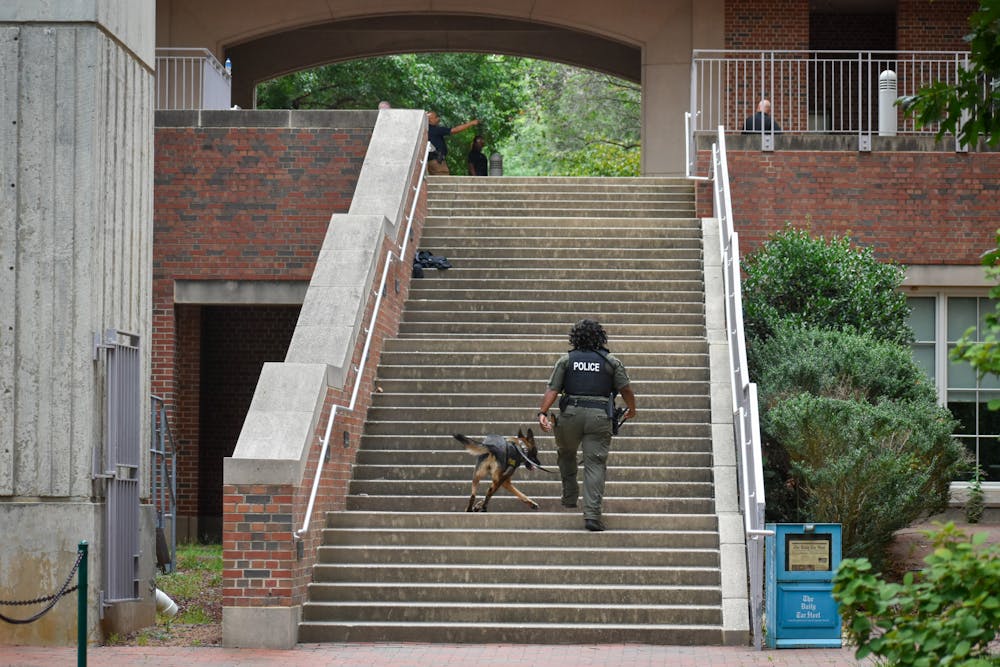After the Aug. 28 shooting and the Sept 13. on-campus gun threat, some professors expressed feelings of unpreparedness for lockdown situations. Professors shared concerns such as not knowing how to lock classroom doors or whether to pause instruction and not being aware of protocol.
Since these events, the University has seen a spike in demand for in-person and online emergency preparedness trainings for faculty, staff and students, UNC Police Chief Brian James said, although the trainings have been available before these gun-related incidents.
According to UNC Media Relations, 384 University employees have undergone online emergency preparedness training provided by the University between Aug. 1 and Oct. 31. James also said over 50 in-person active shooter trainings and 25 building security assessments have been administered by UNC Police since Aug. 28.
“We are certainly pleased with and encouraged by that level of interest and want to make sure that we have the appropriate engagement with them, and to provide them with that training,” Darrell Jeter, UNC Campus Safety director of Emergency Management and Planning, said.
In-person trainings
The Community Services Unit of UNC Police offers the “Active Shooter and Critical Incident Response” training for schools and departments across campus. These trainings include in-person walk-throughs of buildings to teach faculty and staff how to respond to active shooter situations.
Journalism professor Deb Aikat said he participated in a training led by UNC Police Sgt. James David in late October. Aikat said David led a group of about 30 faculty within the Hussman School of Journalism and Media around rooms in Carroll Hall and the Curtis Media Center to demonstrate the use of door-locking mechanisms and other safety measures. He also said Emergency Management attended a Hussman School faculty meeting on Oct. 27 to answer any follow-up questions.
“In many ways, I thought that this is useful to have, but I want to never be at the day when I will have to use it,” Aikat said. He also said he felt videos of this type of training would be helpful, as the in-person tours are time-consuming and not all faculty members are able to attend.
Lynn Eades, technology integration librarian for the Undergraduate Library, said she attended a Zoom meeting on May 15 as part of a “preparedness day” for library staff that included an active shooter training presentation from David.
After the meeting, she saidthe staff visited various library buildings to examine exits and door-locking mechanisms.
“I don't think you can ever really prepare for an active shooter situation, but I do feel like I had a better understanding of it if certain things would happen,” Eades said.
In the building security assessments, James said UNC Police tries to identify where enhancements can be made and take those suggestions to come up with a customized security plan for a particular building.
Online trainings
The online training, called Emergency Preparedness 101 and can be accessed on the Carolina Ready website, aims to familiarize participants with how to respond in a crisis situation.
Aikat, who took the online training this week, said the training could be more engaging and left him with "more questions than answers." He said the training’s four segments are primarily audio-based with supplemental text information and don't address critical questions faculty face, such as what to do if a student needs to use the bathroom during a lockdown, or provide thorough active shooter scenarios.
“In today's world, where we are barraged by so many information sources and so many media distractions, we need a thorough training material that really motivates the trainee to retain the information, and I did not get that,” Aikat said.
Eades, who has not yet taken the online training, said she thinks it should be required for all faculty, staff and students.
“You hate to have to bring home some of those things, but it's good to have that refresher that says, ‘These are some of the things you can do,’” she said.
Jeter said that requiring training has been discussed and would be a policy decision delivered at an administrative leadership level, which Campus Safety would be prepared to support.



